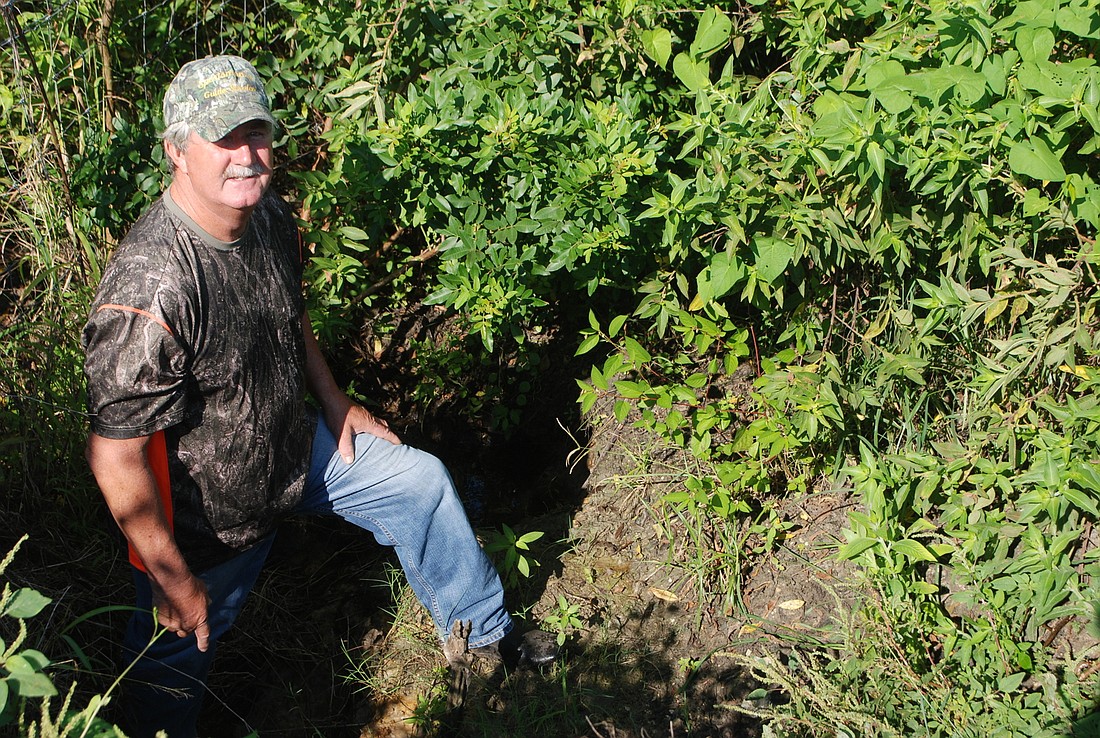- December 26, 2024
-
-
Loading

Loading

Matt Scarbrough stands along the fence where Pineland Reserve abuts the Albritton Ranch and pointed out damage from wild hogs, and coyote tracks. The hogs are getting under the fence and rooting up earth on both sides. Trailer axles break on the uneven ground, coyotes eat or damage crops and deer put too much pressure on native vegetation, allowing non-native plants room to grow.
Scarbrough, who grew up near Myakka State Park, is hoping Sarasota County hunters can help, now that commissioners have removed language from county ordinances that explicitly prohibited hunting and other consumptive activities on public lands.
Scarbrough is a representative of the Sarasota Sportsman’s Association and has been asking the county to allow hunting on public land for 20 years.
“We just want a small piece, for part of the year,” Scarbrough said. “We’ve not asking them to shut down all the parks.”
He manages hog and deer on Albritton Ranch, part of which was sold to the county to create Pineland Preserve.
Scarbrough argued that hunting is a sustainable practice, and hopes the amended language will eventually open parcels east of I-75 such as Pinelands Reserve, Walton Ranch and Carlton and Deer Prairie Creek preserves.
While hunting advocates are focused on the usefulness or sustainability of hunting, opponents — some of whom are experienced hunters — are focused on language related to the county’s land acquisition mandate.
Jono Miller, who serves on two advisory committees to the Sarasota County Commissions, the Environmentally Sensitive Lands Oversight Committee and Parks and Recreation Council, said both recommended against changing the ordinance.
He cited passages from the U.S. Fish and Wildlife Service, among others, that list hunting as a consumptive activity, prohibited on lands acquired under the Environmentally Sensitive Lands Protection Plan. Use of those lands must be nonconsumptive, resource-based and ecologically benign, though exceptions have been created for other consumptive uses, such as fishing.
Allowing hunting on public land would be like allowing patrons at the Van Wezel to take the bolts out of the seats, said Miller, who believes there is room for a legal challenge to the ordinance.
Duette Preserve, in Manatee County, has run a program like the one Scarbrough hopes will be implemented since the early 1990s with no incident, according to Johnny McCloud, superintendent of Manatee County’s East County Parks and Natural Resources.
Staff ultimately decides on wildlife control and management issues at Duette Preserve, but they consider the recommendations of county biologists and information from hunters.
McCloud touted the state’s adoption of stricter rules on hunting bucks, three years after the park had adopted that rule.
Hunters have exclusive access to the park during weekends when hunting is permitted on the 21,000-acre property, but hunts are spaced two to three weeks apart to allow for other uses.
To ensure no one is in the park during their hunting events except hunters, access is tightly controlled and satellite gates are closed and locked, with posted notices explaining why.
McCloud said there have been no accidents, injuries or incidents as a result of allowing hunters to use public land.
He estimated that the park makes $60,000 annually from the 250 to 275 hunters who use the park each year, all of which is allocated to the general fund.
Opponents of hunting on public lands told the board at Monday’s meeting, however, that any revenues would be offset by costs incurred from managing the activity.
Bill Lewis, an avid hiker who was involved with the Audubon Society and the Sierra Club for years, said he will no longer go to Duette because of the hunting permitted there. The schedules become onerous for locals and impractical or even impossible for tourists to work with.
Several of those who spoke in favor of the change at the most recent SCC meeting emphasized, along with the commissioners, that it would not open public lands for hunting without further process.
According to the board, allowing actual hunting would require a parcel-by-parcel assessment process that includes public input.
Only Commissioner Charles Hines voted against the measure, indicating he would rather have a particular tract to discuss than to begin with such a broad stroke.
Commissioner Paul Caragiulo disagreed, saying earlier in the meeting that it made less sense to look for parcels to assess for a strictly prohibited activity.
Commissioner Christine Robinson suggested that hunting would allow some families that couldn’t otherwise afford it access to certain foods.
“There will be residents who will take advantage of this to get red meat,” she said.